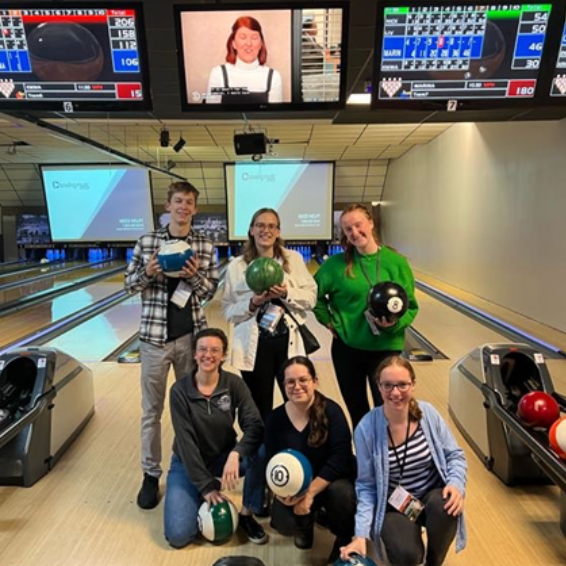Reflections on MEDA Convention 2022
By Emma Kirke
Earlier this month, I packed into a van along with 5 other Grebelites of varying years and programs and headed down to Lancaster Pennsylvania to attend MEDA’s annual convention. Focused on “Celebrating Entrepreneurship,” the convention highlighted the past successes of the organization, as well as exciting new developments to watch for in the coming years. The Mennonite Development Associates organization has been a part of the international economic development arena for nearly seventy years, working in over the same number of countries. Beginning as a collective of Mennonite businesspeople, the organization focuses on creating business solutions to poverty.

Having attended events hosted by civil society groups and nongovernmental organizations in the past, the MEDA convention was an entirely new experience for me with the integration of faith and business throughout the weekend. I came away a new appreciation for the role of entrepreneurship in the Global South for fostering social mobility. Throughout the convention, there were reminders of the importance of leadership drawn from those on-the-ground to create lasting change.
The organization first pursued work in Paraguay with a group of men – yes men and only men – from Canada and the United States travelling to the country to help tackle poverty and other social challenges through business solutions. Over time, the model has much evolved, with a focus on fostering a North-South equilibrium a key objective of MEDA’s work today, and with gender equality at the forefront of ongoing work. Indeed, this original image of white men helping stands in contrast to what I saw at the MEDA convention this past weekend, where there was a clear focus on platforming voices of BIPOC from the Global South.

The right to self-determination has historically not been a feature of international aid efforts, including international economic development. One key example of this approach was described by keynote speaker Ndidi Okonkwo Nwuleni. A businesswoman herself in the agri-food sector, she described how Norwegian aid in the form of stock fish has benefitted Norway’s exports to African nations while destabilizing local agri-food business. Overall, her talk emphasized that until we change the way we view the African continent, particularly in the agri-food sector as a recipient rather than an active player in export markets, its potential will be limited. Other speakers throughout the weekend highlighted that solutions to poverty and food security are best led by those living with the challenges.
In my classes, we often talk about the danger of a single story. Listening to entrepreneurs from Sub-Saharan Africa was an important reminder of how far post-secondary education still must come in better exposing students to a far broader set of stories about the intersection of social change and business. Particularly given the continent of Africa is so young – the average age is eighteen – the future will only create an increasingly diverse array of narratives that offer different paths to a better future.
Outside the convention venue, there were opportunities to participate in tours of the local region. Having an interest in American history, I opted for an African American History Walking tour of the city. Lancaster, PA, is noteworthy both for being the capital of the United States – for a single day during the American Revolution – but also having been a common stop for escaping slaves along the Underground Railroad, being just north of the Mason-Dixon line. Our wonderful tour guide, Nelson Polite Jr., highlighted how the history of the challenges faced by African Americans continues to be reflected in the present. Indeed, his grandfather’s house is listed in the Green Book as a safe location where African Americans could stop as they navigated through segregated America. Thaddeus Stevens, an abolitionist acclaimed for having been a thorn in the side of Lincoln for pushing him to continue to strive for emancipation, has deep roots in the community. Beyond emancipation from the horrors of slavery, Stevens also pushed for reparations, challenging the government to recognize the 250 years of unpaid labour that had left African Americans economically disadvantaged as the country went through reconstruction after the American Civil War. Without being given the opportunity to thrive with the correct support following the end of slavery, many Black communities simply survived.

Access to resources is a key element in providing those living in poverty the opportunity to self-determine their own future. Throughout the weekend, there were many excited references to a major new African investment fund that MEDA is launching. Beyond the excitement around the size of the initiative, there was also a great deal of significance placed on the fact that it will act as a fund of funds. This structure means that it will funnel money into several locally led funds, empowering those on the ground to invest in turn in hundreds of small and medium-sized businesses on the African continent. By focusing on companies traditionally denied funding, it will transfer that economic power to ensure that self-determination is a fact rather than a possibility.
Moving forward, the presentations and conversations had this weekend on the topic of empowering Africans through moving towards a North-South equilibrium felt particularly relevant with the COP27 taking place these next two weeks in Egypt. With COP26 last year in Glasgow laying out the Glasgow Pact laying out the roadmap for climate action for the upcoming years, this Conference of the Parties is intended to be an African COP, symbolically held on a continent that expects to be at the receiving end of aid specifically for climate disaster relief. Prior to the start of the gathering, of the 193 countries that pledged to step up the ambition of their efforts to fight climate change at the summit last year, only 26 had followed through. Of those, only a few are providing direct aid, allowing the countries to allocate resources as they see fit.
As one session facilitator stated during the conference: change happens at the speed of trust. In equipping the most vulnerable to bear the burdens of humanity’s impact on this planet, we need to listen and support to the right voices to give them the best chance to thrive rather than simply survive.
Next year the MEDA convention will be taking place much closer to home in Toronto, increasing its accessibility to members of the Grebel and Centre for Peace Advancement communities.